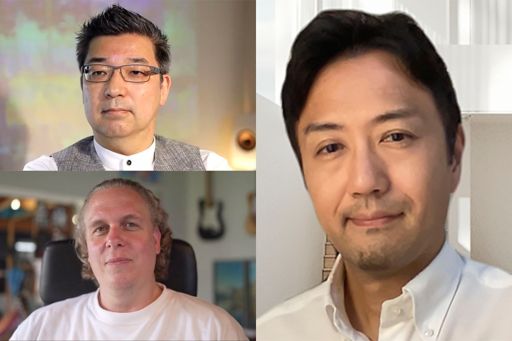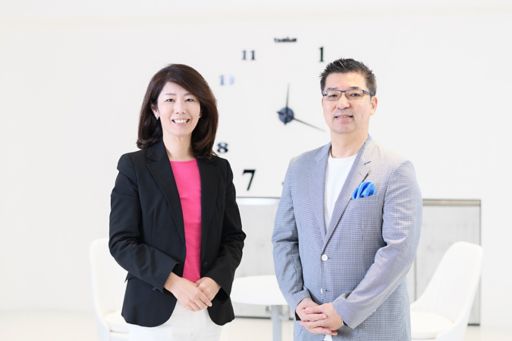The “sharing business,” which became a hot topic with the entrance of Airbnb and Uber in the market, has quickly penetrated the market with the spread of COVID-19. While there are expectations of “realizing a free working style” and “lowering the hurdles for starting businesses,” there are still unavoidable issues to be discussed for business growth, such as compliance with laws and regulations, optimization of the industry and resolution of conflicts with existing stakeholders.
However, a market that has been cultivated once will never disappear. How will it fit in with society and how will the power of digital technology be utilized in the process? In this article, we will introduce the discussions filled with visions and fantasies conducted between Akiko Nishiura of Nokisaki, inc. and Masayuki Chatani of KPMG Ignition Tokyo.
Contents
- Link to Vol. 1
- Resolving Issues of Local Communities with Nokisaki
- Nokisaki Satisfies New Social Needs
- Stimulating Next-Generation Leaders
- DX Interpreted by a Digital-Native Business
- Possibility of Technology Resolving Companies’ Management Issues
- Ways to Maintain “Regional Character” Revealed by Renting Nokisaki
- Integration of Analogue and Digital Technology Is Creating Innovation
- Profile of Interviewee
Resolving Issues of Local Communities with Nokisaki
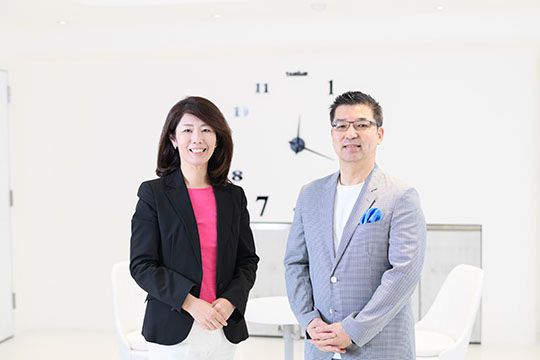
(Akiko Nishiura, Founder and CEO of Nokisaki, Inc. (left), Masayuki Chatani, Representative Director & CEO of KPMG Ignition Tokyo and CDO of KPMG Japan (right)) *Professional affiliation and official position in the article are at the time of publication.
Chatani: Collaboration with local governments can be considered regarding Nokisaki Parking but are you engaged in such activities?
Nishiura: Regarding the sharing economy such as Nokisaki Parking, an environment to promote the business led by the government was already being organized with the establishment of the Sharing Economy Promotion Office within the Cabinet Secretariat IT Strategy Office in 2017. Specific initiatives include a project called “Share Nippon 100,” which encourages local governments and private businesses to utilize the sharing economy to resolve issues and revitalize the economies of local communities.
This project has increased opportunities for private businesses to propose resolutions to local governments that feel that it is difficult to tackle issues on their own and with only subsidies from the national government.
Nokisaki Parking also participated in this activity and according to them, the parking problem seems to have long been a source of concern as a problem that is difficult to resolve.
For instance, when large-scale fireworks events and famous festivals are held, there are many visitors coming in from outside the prefecture, many of whom arrive by car.
However, there are not enough coin-operated parking lots in the areas where these events are held, which leads to illegal parking everywhere and results in traffic congestion. Claims from residents increase as might be expected, but as budgets are not ample enough, they end up not being able to resolve the problem every year. Nokisaki Parking offered to help resolve the problem and was accepted.
In our case, most of our projects were introduced as partnership agreements based on trials. First of all, we worked to secure parking spaces with local government officials by holding a meeting with the local residents prior to the fireworks event to ask them to rent out vacant land or parking spaces.
At first, we were worried whether car users would reserve parking spaces from the website but when we surveyed the users that actually used Nokisaki Parking, we learned that it was favorably accepted, as we received comments such as “we can go to the event with peace of mind knowing that we have secured a parking space in advance.”
Chatani: So, you have actually resolved the issues faced by local communities and revitalized their economies.
Nokisaki Satisfies New Social Needs
Chatani: I understand that Nokisaki Parking is also providing a service for “Shahaku (sleeping overnight in cars).” Though this word is still unfamiliar, I assume that the number of users is increasing with the spread of COVID-19.
Nishiura: Yes. While there has been a travelling style of sleeping in the car for some time, this is a market which is expanding strongly by 30 to 40% against the previous year owing to COVID-19. I guess this is because camping and outdoor activities enable people to enjoy nature without getting close to other people.
For users that want to sleep overnight in their cars, Nokisaki Parking suggests they reserve parking lots at roadside stations. There is always a hot bath facility within five minutes’ walk from the rented parking space, so users can drive to the location in their private car, use the hot bath facility and sleep overnight at the parking lot at the roadside station reserved in advance.
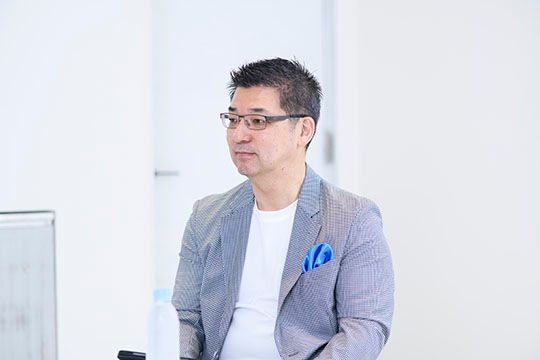
There is also a power supply facility in the parking lot of the roadside station and users can use the external power supply by operating it with a QR code. They can also borrow camping gear, as various items are available for rent.
Chatani: That sounds great for going star gazing.
Nishiura: We are now handling parking lots at 30 roadside stations in Kyushu. As they are all surrounded by nature, I can recommend using the service for such a purpose.
Stimulating Next-Generation Leaders
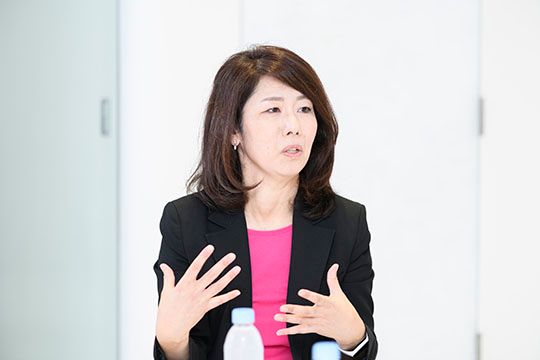
Chatani: You have so far told us the story of how you developed the seeds of your business, which you found by chance, but I heard that you have recently been taking on the challenge of industry-academia collaboration. Can you tell us about this initiative as well?
Nishiura: We are implementing industry-academia collaboration with Meisei University. There are many students who aim to inherit or start a business. I am telling them my start-up stories and creating hands-on learning opportunities by giving them assignments such as, “let’s try something new by utilizing the space registered at Nokisaki Business.”
It is very stimulating for us, as new businesses with flexible ideas which we would never have imagined are created. I also think that we can increase their motivation by setting assignments that involve real businesses.
Chatani: I think that developing next-generation human resources will also support sustainable economic activities. You mentioned at the beginning of the interview that you wished that there were “opportunities to start business more easily” but are you conscious of SDGs and ESG as Nokisaki, Inc.?
Nishiura: When we first started out, we were conscious of the sustainability of society because we used the expression “we want to utilize space that is being wasted.” Real estate that is not being used is simply mottainai (wasteful) and if the value of a town increases as a result of utilizing wasted space without spending money, I think that is a good thing.
When we established the company, there was no concept of SDGs or ESG and not much attention was given to the Millennium Development Goals either. However, due to recent trends, I have come to believe that our company’s way of thinking coincides with SDGs/ESG. Though we don’t state this specifically as a company, we strongly believe that we want to provide equal opportunities for everyone and to create a society where opportunities can be easily obtained especially when starting a new business.”
DX Interpreted by a Digital-Native Business
Chatani: Talking about realizing a sustainable society and a society where it is easy to start a business, principles are important but the use of digital power and technology is indispensable to realize such a society. As you have been running your business using technology since the company was established, I don’t think you have any pressing concern regarding DX (Digital Transformation) but what are your thoughts regarding the use of digital technology?
Nishiura: Originally in Japan, there has been a culture of borrowing and lending miso and soy sauce with neighbors living in three houses on both sides. In other words, we can say that the neighbors living “up to three houses away” were the limit of neighbors that could be relied on.
However, with the penetration of technology in society, you can now rent out your house to people living on the other side of the globe if you want to. In this case, you can confirm the reliability of the person you have never met before by looking at various ratings and referrals. It can be said that the sharing economy is built on such digital power.
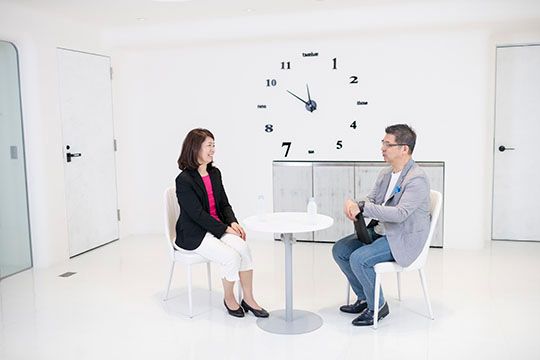
Chatani: I have been thinking for some time that the Chief x Officer (CxO) of AI is an extension of this concept. What I can envisage is AI managers of companies that have never done any business with each other finding opportunities by exchanging fully encrypted corporate information and creating new businesses.
In order to achieve this, I wanted to create an AI CEO, so I took on the challenge, but when I thought about it carefully, I realized that famous CEOs are the hardest people to convert to AI (laughs).
I then reconsidered this and I came up with the idea of an “AI CFO.” CFOs need to have consistency and, as they handle numbers, they can be considered to be, in a way, people who enjoy the benefits of computers the most. If this scheme is realized, many small companies consisting of one human manager with an AI management team may be established.
If so, it may be easier for businesses like Nokisaki, whose foundation is built on technology, to accelerate growth. If Nokisaki, Inc. enters the Chilean market, which you are closely related to, we can “fantasize” that the CEO will be an AI who will promote business by copying what you are doing in Japan and localizing it to suit the characteristics of the region.
Nishiura: That sounds very interesting! For a long time, I have been wanting to spread the word “Nokisaki (eaves of a house = free space)” and the human touch that is included in this word to the world and establish it like the word “karaoke.” I feel that such a dream-like opportunity can be realized.
Chatani: “Expanding Nokisaki Culture abroad” seems like a worthy challenge.
The use of an AI management team that could become the management of “Nokisaki Chile” may be a little similar to Nokisaki Business, which does not require a fixed location.
Needless to say, human power will be necessary when a problem occurs. We may be able to summon great experts when that happens and I think that in some cases, it is more probable that this method will enhance the accuracy of judgements when resolving issues.
I feel that medical treatment has recently been advancing in this direction. In a conventional medical setting, examinations were carried out only after patients had declared their symptoms such as “having a stomachache.” Nowadays, however, patients are diagnosed by the doctor after they have been scanned from head to toe and risk analyses such as “there may be something wrong here” are conducted. I think that many professional services will advance in this direction.
I think that this way of thinking will lead to a world view where we can understand that “something seems to be wrong here” by scanning companies from head to toe.
Possibility of Technology Resolving Companies’ Management Issues
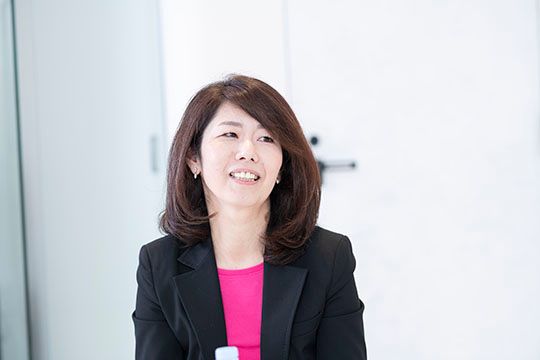
Nishiura: Listening to your story about an AI management team, I recalled the management issues faced by my company. Our biggest issue is that I am deciding almost everything by myself while concurrently serving as a CFO.” I feel that this is the biggest issue we face in growing one step further.
The reason why we are in this situation, I think, is that we created and proceeded with the service that I wanted, as I mentioned earlier when explaining why I started the business. You might say that we did not go through the process of envisioning the image of what we were aiming at in the “target market” and creating the necessary team by calculating backward like normal venture businesses.
Chatani: A CEO AI assistant system may fit well in that case.
I think the issue you just mentioned is actually felt by all start-ups. As they do not have abundant budgets and resources at the time of establishment, it is hard for them to employ the most suitable personnel. Furthermore, people who gather around technical services in particular are not so strong in non-technology sectors, which eventually gives rise to issues in later years.
In fact, there are not many places where these concerns, which every CTO may be facing, can be shared and I imagine that many of the issues can be resolved by accumulating a number of case studies and making them accessible.
Nishiura: You’re quite right! Even though every start-up is probably stumbling at around the same point, these matters are not being shared.
I truly hope that we can eliminate little pains by making greater use of technology to share the collective intelligence of everyone’s issues.
Ways to Maintain “Regional Character” Revealed by Renting Nokisaki
Nishiura: What we at Nokisaki, Inc. are aiming at is to boost the appeal of towns by utilizing free spaces in real estate.
Meanwhile, the real estate market is one of the few industries in which DX has made little progress. This is the reason why there are still some agents that are doing business by using the overwhelming imbalance of information about real estate that exists between professionals and consumers.
There is also continuing frustration that the value of areas that should normally be evaluated is being overlooked and they end up being evaluated based on uniform indexes such as street value, land area and the distance from the station.
This is where I want to consult you, Chatani-san. I wonder if it is possible to evaluate or add value to the appeal of towns by using the power of technology.
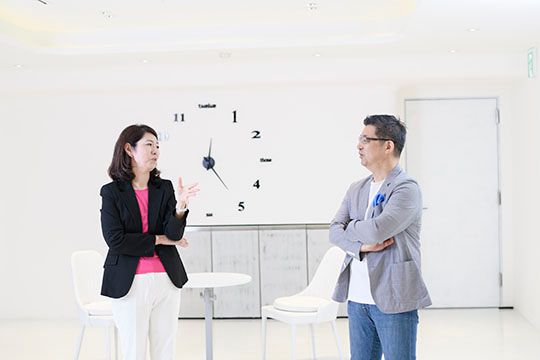
Chatani: That may be similar to the evaluation of non-financial information. As you well know, there is a trend to evaluate corporate character, like human character, such as by whether the materials were procured through fair trade or whether enforced labor or child labor were not used as the labor force.
If an undesirable condition is exposed, this may lead to a consumer boycott. While this is becoming a new issue for companies, this trend itself is considered to be a great thing. This change is also a challenge to evaluate companies based on information other than numbers such as sales and profits.
If we associate this with towns, it probably means evaluating matters that are not just numbers such as the population and crime rate. This trend will probably come sooner or later because it is now possible to handle a massive amount of data that could not be processed by computers before and it will become very common for information that is the source of evaluation criteria to be investigated and taken into account.
In that event, I think that not just traditionally used easy-to-process information such as the price per square meter but also multifaceted evaluations such as the smell of the town will be evaluated and become one of the judgement criteria.
I imagine that this will be a very favorable thing for towns but we can also think of cases where we can’t say for sure that it is favorable. For instance, there may be information that it is a great place with rich natural surroundings but the loud chorus of frogs at night is unbearable.
In any case, after such a non-numerical evaluation axis is introduced, if we are shown just the price per square meter without any other information, we may start to feel that “something is being covered up.”
Nishiura: I hope that the evaluation method will change in this way. While operating Nokisaki Business, I have been wanting to change the situation where “everywhere you go, in front of the station is the same chain store, and every town looks similar.”
I think that the reason for this is also the impact of information asymmetry. The tenants of shopping malls are almost the same everywhere you go, which is making it difficult to bring out the originality of towns. This also means that places where private shops can operate are disappearing rapidly.
It is such a shame that towns all look the same everywhere we go. This is why I am hoping to discover “minor free spaces” where major players do not invest their capital and create a place where local people can participate actively.
However, lenders also have their compelling reasons so I think it is not easy to resolve this issue. As it is landlords and real-estate owners who decide who they want to allow to use their land, we can’t blame them for choosing people who buy or rent their land for higher prices. However, I do hope that they will choose to make decisions by thinking how the town they are living in or the real estate they own will lead to enhancing the value of the areas they belong to.
Integration of Analogue and Digital Technology Is Creating Innovation
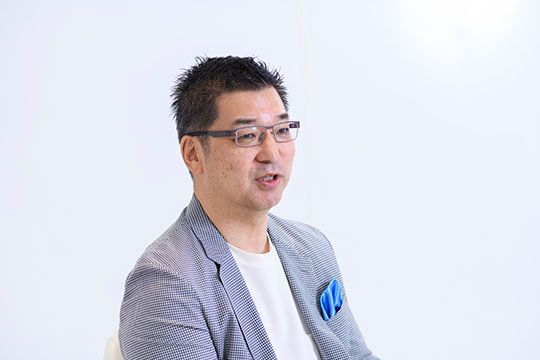
Chatani: I felt that Nokisaki Business and Nokisaki Parking are playing a major role in terms of maintaining the smell and the character of towns. I understand that you are creating another business in terms of further developing these initiatives. What kind of business are you working on?
Nishiura: We started a business called “magari (renting restaurant space),” which is more like our 2.5th axis rather than the third axis. This is the restaurant version of Nokisaki Business. It creates opportunities for other restaurant operators to use the store when it is not used. For instance, izakayas (Japanese casual bars also serving various dishes and snacks) and bars, which operate only at night, can rent out their stores during the daytime hours to create an opportunity for other restaurant operators to provide their business there. “Magari Curry” is a major type of this business.
Chatani: There was a store that was operating a similar business in Silicon Valley too! It was a snack bar at night but when the owner tried offering ramen, which was his hobby, for lunch, it became a big hit and became a ramen shop with long lines of customers.
Nishiura: That is a successful example. Among a number of businesses, the restaurant business requires high initial investment and the success rate is extremely low compared to any other business. This means that it is highly risky for individuals to start a restaurant business. This business is also distinct in that there are many people who take on the challenge despite the risk.
Chatani: Indeed, there is a store near my house that has changed many times with all its furnishings.
Nishiura: There are many places like that and we cannot help but wonder whether there is something wrong with the place. However, from the standpoint of the owners, their honest feeling is that they don’t care who the tenants are or what they do and whether they are making a profit or not, as long as they pay the rent every month. In fact, I feel that they should properly communicate to the new tenant that “the previous tenant closed the store in six months” so that the next challenger can continue for as long as possible.
Chatani: That’s true. If the tenant is able to operate for a longer period than the previous restaurant, the residents will talk not about its taste but how “the store is doing better than before,” which is completely irrelevant.
Nishiura: I am concerned that the information asymmetry of the tenant business in commercial complexes is so high that unless we do something, private shops will continue to disappear, leaving only the chain stores. We started the “magari” business based on this concern, but our operation is still very analogue.
In the first place, borrowing and lending restaurant spaces involve risks for the building owners and the tenants who are renting the place from the owner. It can also be assumed that there is also more than a little risk for customers who come to eat there. That’s why we ask for an insurance package that includes insurance in case of damage to the building due to fire, insurance in case of damage to movable assets such as store fixtures, tables and seats by the tenant, and product-liability insurance in case of food poisoning among customers, and make sure that they are included in the rent.
As for the borrowers, I think that, basically, the responsibility mainly lies with those who are taking on the challenge. People who want to start a restaurant business are a mixture of those who “have apprenticed for 20 years at a famous restaurant and are opening their long-awaited store” and those who have zero experience in a restaurant business but “want to offer their specialty cuisine to everyone.” Some quit after half a year or half a month while others continue for many years. It depends on the person.
Our way of thinking is to provide an opportunity to those who want to take on a challenge while preparing insurance for hedging assumable risks.
However, borrowing and lending space is greatly affected by the chemistry between the two parties. We therefore carry out an analogue matching operation, have the borrower take a look at the store and have an interview with the three parties—the store owner, the borrower and our staff. We have the borrower make a presentation on “what kind of menu they want to offer” and arrange conditions such as “what kind of fixtures they want to borrow and how much space in the refrigerator they want to use.” This part is very different from Nokisaki Business and Nokisaki Parking.
When we consider that there is no problem after the meeting, we start the service based on the agreement between the three parties. Even though it is a web-based system, the process is carried out in a very analogue way. We are considering to what extent we can systematize the process, for example, which part of the process can be indexed.
Chatani: A completely different scene may emerge if AI is introduced here. It’s great that the unique “color” of the town will come out by increasing the number of private stores in this way.
Nishiura: That’s right. This is an irregular case but there was a group of five female university students who applied for “magari.” They wanted to open their own café for one month, saying that “they wanted to do something memorable because they could not go on a graduation trip due to the spread of COVID-19.” They actually opened a café in a bistro near the Skytree where they made and sold hand-made muffins and scones. They weren’t thinking about profit but I think they were able to create great memories. This kind of project is quite exciting and I imagine that using stores in this way will help to build the character of the town.
Profile of Interviewee
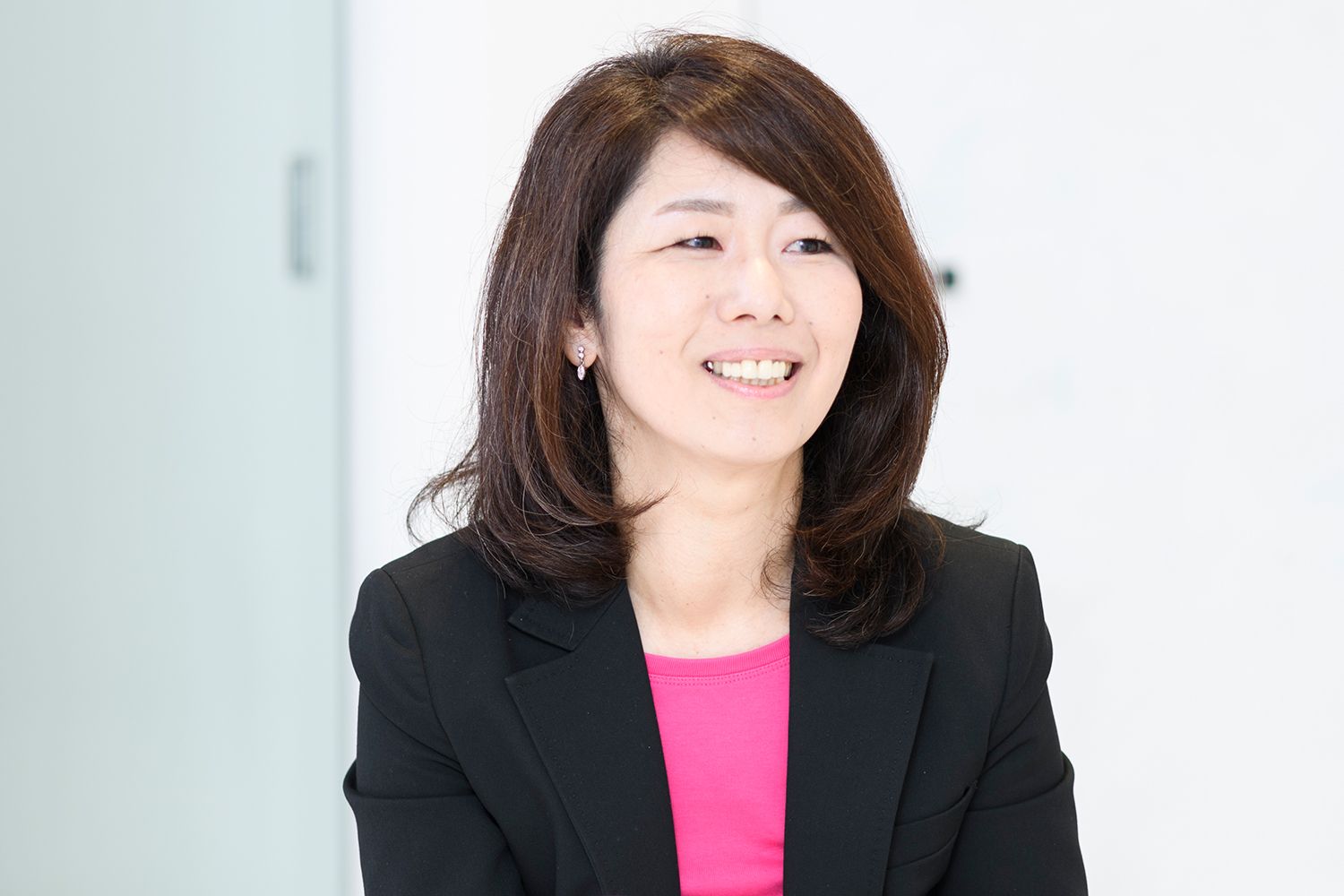
Akiko Nishiura
Founder and CEO of Nokisaki, Inc.
After graduating from Sophia University, Akiko Nishiura joined Sony Corporation. She was responsible for marketing and sales promotion of AV products for overseas markets and gained experience working in Chile, South America, as a product manager for over five years. She returned to Japan after leaving Sony and worked on the establishment of All About, Inc. as an advertising sales VP. She then joined Sony Interactive Entertainment Inc., where she was involved in the localization and product development of PlayStation 2 and PSP in the Product Planning Division. Deciding to start her own business on the occasion of the birth of her child, she started Japan’s first space sharing service in April 2008 as the representative of “Nokisaki” and established Nokisaki, Inc. in 2009. The company operates the “Nokisaki Business” for shared pop-up store space, “Nokisaki Parking” for shared parking space, and “magari” for shared restaurant space. She received the Incentive Award in the ICT Regional Revitalization Awards from the Ministry of Internal Affairs and Communications in 2017. She is now busily engaged in making proposals for the use of unused space throughout Japan.
Follow us on KPMG Ignition Tokyo LinkedIn for the latest news.
Connect with us
- Find office locations kpmg.findOfficeLocations
- kpmg.emailUs
- Social media @ KPMG kpmg.socialMedia



